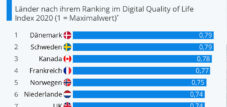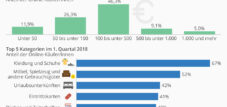Disaster country Germany: 99 percent of the digital budget was canceled by the federal government
Language selection 📢
Published on: August 3, 2023 / update from: August 3, 2023 - Author: Konrad Wolfenstein
The delay in digitalization in Germany and its consequences
FRG 2024: A republic between bananas and fax machines
Although politicians have made big promises, the reality leaves much to be desired. Germany lags behind other countries such as Austria and Estonia, which have already successfully implemented comprehensive digital services for their citizens.
Status of digitalization in Germany
The German government has turned its back on its original commitments to create a digital state, as shown in the 2024 budget, which allocates just three million euros for digitalization. Unfortunately, digitalization in Germany often just means making forms accessible online in PDF format, while actual processes still require physical signatures and submissions. This is in stark contrast to countries such as Austria and Estonia, which have successfully implemented comprehensive digital services for their citizens.
The consequences of reluctance to digitize
This hesitancy on the part of the government has significant consequences. One example is the lack of the ability to digitally register new cars, which can cost Germany over 30 million euros annually. In addition, digital processes could significantly reduce CO₂ emissions. Denying the benefits of digitalization seems counterproductive given its potential benefits.
Digitalization as an opportunity for Germany
Instead of seeing digitalization as a burden, we should see it as an opportunity. By investing in digital solutions, we can not only increase efficiency but also achieve financial savings. The implementation of comprehensive digital services can reduce the burden on administration and speed up the completion of bureaucratic matters.
Exemplary countries
A look at countries like Austria and Estonia shows us that it is possible to build an efficient and user-friendly digital infrastructure. In these countries, citizens can complete many administrative procedures online, saving time and resources. Germany can learn from their experiences and adapt their proven digital solutions.
Germany, a country between a banana republic and fax machines
The German government should reconsider its reluctance to digitize. Investing in digital solutions can not only increase efficiency, but also provide significant financial savings and have a positive impact on the environment. By drawing inspiration from countries like Austria and Estonia and leveraging their experiences, Germany can pave the way to a truly digital state. The time to act is now to harness the full potential of digitalization and drive progress for citizens and the economy.
Bavaria's commitment to digitalization: Investment of 5.5 billion euros planned
The criticism of the Bavarian State Minister for Digital, Judith Gerlach, of the planned drastic cuts in digital investments by the federal government
In this section we examine the criticism of Judith Gerlach, the Bavarian State Minister for Digital, of the planned radical cuts in digital investments by the federal government. The proposed savings measures are intended to reduce the digital budget to just three million euros, compared to the previous 377 million euros. This raises concerns about the ability and goal of the state of Bavaria to advance the digitalization of services for citizens. In contrast, Bavaria is determined to further promote digitalization and plans to invest an impressive 5.5 billion euros in the future, with over half a billion euros set to be allocated to digital plan projects this year. The minister emphasizes the importance of digital identities for successful administrative digitalization.
The federal government's planned cuts
The federal government's planned cuts in digital investments have caused great concern for Judith Gerlach, the Bavarian State Minister for Digital. Drastically reducing the digital budget to just three million euros would significantly impact Bavaria's ability to provide its citizens with advanced digital services. It is known that digitalization is becoming increasingly important in people's everyday lives, and it is therefore essential to provide sufficient financial resources to drive digital progress.
Bavaria's commitment to digitalization
In contrast to the federal government's austerity plans, Bavaria is resolutely committed to promoting digitalization. With an impressive investment of 5.5 billion euros for the future, the state is demonstrating its commitment to a digitalized society. These investments are intended to help make Bavaria a pioneer in digitalization and provide its citizens with innovative digital services.
The importance of digital identities
A key aspect that Judith Gerlach highlighted is the importance of digital identities for successful administrative digitalization. Digital identities enable citizens to identify themselves securely and trustworthy online and to carry out official procedures from the comfort of their own home. This not only helps to increase administrative efficiency, but also ensures that sensitive data is protected and misuse is avoided.
The impact of the cuts on citizens
The planned cuts in digital investments by the federal government would have far-reaching effects on the citizens of Bavaria. Without sufficient financial resources, the provision of advanced digital services to the people of the country would be made significantly more difficult. This could lead to administrative procedures becoming more complicated and longer waiting times. In addition, innovative projects and digital solutions that would be of benefit to citizens would not be able to be realized.
Bavaria's vision for the future
Bavaria has a clear vision for the future: The state wants to be a leader in digitalization and offer its citizens the most modern digital services. Sufficient investments are essential for this. Bavaria is prepared to provide over half a billion euros for digital plan projects this year to achieve this goal. These projects are intended to improve the quality of life of citizens and make administration more efficient.
Criticism by Judith Gerlach
Overall, Judith Gerlach's criticism of the federal government's planned cuts in digital investments shows how important it is to advance digitalization in Germany. Bavaria is setting an impressive example here and is planning massive investments in the future. The importance of digital identities for successful administrative digitalization should not be underestimated. In order to realize the vision of a modern, digitalized society, it is essential to provide sufficient financial resources and promote innovative projects.






























